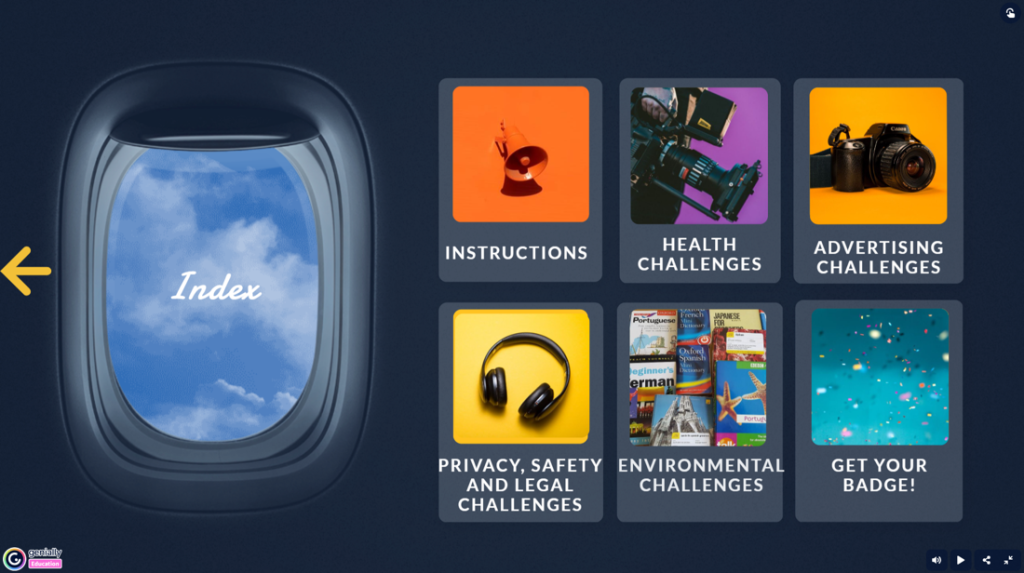To date, very few digital game-based pedagogical materials exist to foster the development of digital competency among learners of English as a Second Language (ESL) in higher education in Quebec. This is exactly why I set out to create a game-based open educational resource (OER) that combines ESL acquisition, cultural enrichment, and the development of digital competency at the college level. More specifically, I am developing an innovative digital serious game entitled An English Journey through the Digital World and English Culture, which has multiple learning outcomes, detailed in this article.
With the arrival of conversational agents based on artificial intelligence, such as ChatGPT 3.5 in the fall of 2022, the relevance of such a project takes on its full meaning. The project has 3 objectives:
- to create ESL OERs for college-level ESL courses
- to enrich Quebec students’ English culture
- to promote the development of students’ digital competency
In addition to supporting ESL learning through stimulating, entertaining content on topics consistent with the ministerial guidelines, this project will contribute to offering Quebec’s French speakers the opportunity to develop their ethical citizenship and cultural knowledge.
Gamification and serious games
Gamification [in French] refers to the application of game-design elements and game principles in non-game contexts. By incorporating game elements into educational content, gamification aims at making learning more engaging but also enhancing motivation and participation among learners. It aims at transforming mundane tasks into exciting challenges, fostering a deeper engagement with the material.
Serious games [in French] are designed with a primary purpose other than pure entertainment. These games aim to educate, train, or inform, providing a dynamic environment for learners to interact with real-world scenarios and problem-solving tasks. These games can simulate complex systems or scenarios, allowing students to experience and understand concepts firsthand, which is particularly beneficial in subjects like digital literacy.
ESL and digital literacy skills
In today’s digital age, proficiency in digital literacy is essential. Serious games and gamified learning environments offer a unique opportunity to develop these essential skills. By navigating digital platforms, learners enhance their ability to find, evaluate, and communicate information via digital technologies. Games that require players to research information, collaborate with others online, or navigate digital landscapes can significantly improve digital literacy.
For ESL learners, the immersive nature of games and gamified environments can be particularly beneficial. Language learning games can simulate real-life interactions and conversations, providing a safe space for learners to practice language skills without the fear of real-world consequences. Moreover, the contextual learning offered by serious games can enhance vocabulary retention and grammatical understanding by situating language use in relevant scenarios.
Thus, the game is rooted in the measures to be pursued in the Digital Action Plan and in the recommendations of the Avis du Conseil supérieur de l’éducation Formation collégiale, Expérience éducative et nouvelles réalités [in French], particularly those related to 21st-century competencies.
The 5 open digital learning missions created as part of the project make advanced-level students face different challenges, as presented in the Digital Competency Framework. According to the Ministère de l’éducation, digital competency is the ability to act as an ethical citizen in the digital age by considering the 12 dimensions described in the framework.
More specifically, the themes of the challenges of this serious game are aligned with the following dimensions of the framework:
- Central dimension: Ethical citizenship
- Dimension 4: Information literacy
- Dimension 6: Communication
- Dimension 7: Content production
- Dimension 11: Critical thinking
In addition to achieving these objectives, the project aims at promoting student success and perseverance as well as the pooling of resources, since the OERs created as part of the project will be indexed to Pavillon and thus accessible to the entire college network community. This kind of reuse is particularly important in a context of human resources shortages and limited financial resources.
The project
Game development
The game is currently in the final stages of development:
- Missions 1 and 2 are completed and validated by students and a few teacher colleagues.
- Mission 3 is in development.
- Missions 4 and 5 will be developed by June 2024.

Menu screen for mission 1, on ethical citizenship
Parallel to the missions themselves, I am also writing a pedagogical guide to help colleagues integrate the game into their courses. This guide will also provide extra writing and speaking activities.

